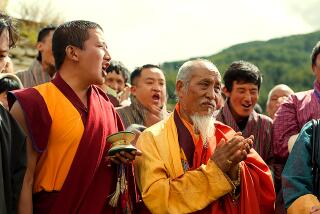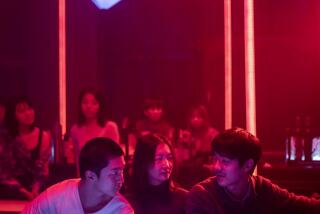CHINESE FOURSOME IN A COMEDY ROMP
- Share via
Imagine “Bob and Carol and Ted and Alice” set down amid Chinese peasantry. Bizarre as it may seem, you’d have a rough idea of what Yan Xueshu’s delightful and provocative “In the Wild Mountains” (screening Saturday at 7:30 p.m. at UCLA Melnitz) is like. A rambunctious yet thoughtful comedy, it tells of two unhappy couples. The burly, uncouth Huihui (Xin Ming) laments that his vivacious, independent wife Guilan (Yue Hong) is barren; meanwhile, Huihui’s slender, feckless brother Hehe (Du Yuan) has more or less abandoned his deceptively demure-looking wife Qiurong (Xu Shouli) and their baby. Huihui and his sister-in-law take a traditional view of marriage while Guilan is determinedly liberated and more than willing to take a chance in supporting her brother-in-law in a money-making venture (which in its modest way smacks of free enterprise).
As this very lively and likable quartet sort out their lives, the film takes on an increasingly broader perspective in which we witness the growing impact of the modern world in bringing a breath of fresh, liberating air to a farming village still pursuing a way of life so ancient that its homes have neither electricity nor even glass (a Chinese invention, after all) for window panes. “In the Wild Mountains” took the Golden Rooster, China’s Oscar, for best picture of 1986--and no wonder.
The film is part of the UCLA Film Archives’ “Discovering the New Chinese Cinema,” and like two of the other four films that conclude the series this weekend, it has a strong feminist sentiment. The other two similarly themed films are Xie Fei and Wu Lan’s “A Girl From Hunan” (screening Thursday, following the 7:30 p.m. showing of “On the Hunting Ground”) and Chen Kaige’s “Yellow Earth” (screening Sunday at 7:30 p.m.). These two, however, are both period pieces. The first, which was unavailable for review, is based on a 1929 novel highly critical of a feudal society in which an 18-year-old woman in a remote village is married off to a child husband--with drastic consequences. (“A Girl From Hunan” is, by the way, the first new Chinese film to show female nudity.) The second, set in 1939, is a richly stylized, visually stunning account of a young girl (Xue Bai) of the rugged Shaxi Province gradually gathering the courage to resist the custom of arranged marriages. The film is also notable for its large array of poetic folk ballads.
Once past its opening sequence, Tian Zhuangzhuang’s “On the Hunting Ground” becomes an austere, ritualistic Miklos Jancso-like depiction of life on the Mongolian grasslands where daily conduct is still ruled by precepts set down by Genghis Khan. But be warned: The film’s first 12 minutes are given over the shooting of sheep and deer, whose death throes are shown in protracted close-up. It has been stated that the film maker wished to contrast the violence of the hunt with the comparative tranquillity of the Mongolian existence, but to what purpose is not clear. Information: (213) 825-2345, 825-2581.
Life devoid of meaning, apart from that which is conferred by Hollywood movies, is depicted in somber but very different and challenging ways in Nikos Panayotopoulos’ “Varieties” and in Nikos Nikolaidis’ “Sweet Bunch,” which screen Sunday in the Nuart’s “Greek Film Festival.” The surreal, Antonioni-like “Varieties” is concerned with the eternal challenge of creativity and imagination for the artist, which in this instance is a film maker faced with characters who complain that they lack the adventures dreamed up for their Hollywood counterparts.
Nikolaidis’ striking sense of the visual and his intellectual rigor stave off pretentiousness. “Sweet Bunch” is rightly disturbing in two ways: first, for the utter amorality of a group of people, several of whom are past 30, who live a vicious criminal existence yet are remarkably tender toward each other within the confines of their kitsch-pop art-filled estate--one of them is an avid James Dean worshiper; second, for eliciting so little emotional response to their fates when they reach their inevitable bad end. At 2 hours, 34 minutes, “Sweet Bunch” never bores but overplays its romantic existentialism. Information: (213) 478-6379, 479-5269 .
More to Read
Only good movies
Get the Indie Focus newsletter, Mark Olsen's weekly guide to the world of cinema.
You may occasionally receive promotional content from the Los Angeles Times.










